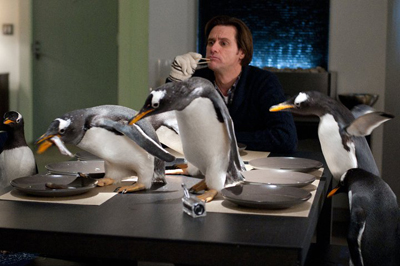Book Vs. Movie: Mr. Popper's Penguins
By Russ Bickerstaff
June 22, 2011
Book Vs. Movie: Mr. Popper’s Penguins
In this corner: the Book. A collection of words that represent ideas when filtered through the lexical systems in a human brain. From clay tablets to bound collections of wood pulp to units of stored data, the book has been around in one format or another for some 3,800 years.
And in this corner: the Movie. A 112-year-old kid born in France to a guy named Lumiere and raised primarily in Hollywood by his uncle Charlie "the Tramp" Chaplin. This young upstart has quickly made a huge impact on society, rapidly becoming the most financially lucrative form of storytelling in the modern world.
Both square off in the ring again as Box Office Prophets presents another round of Book vs. Movie.
Mr. Popper’s Penguins
Richard Atwater taught Greek at the University of Chicago in the early 20th century. He worked as a journalist in Chicago. In the 1930s when there was a far bigger market for print journalism, Atwater had made the rounds writing for the Chicago Evening Post, the Chicago Daily News, the Chicago Tribune, and the Herald-Examiner. In his spare time he wrote fiction. It’s safe to say that the vast majority of the words the man wrote have been completely forgotten. The reason Atwater is remembered at all is due to a work that he had written with his wife Florence. Inspired by an old documentary about Admiral Byrd’s trip to the Antarctic, Richard and Florence worked on a children’s book called, Ork! The Story of Mr. Popper's Penguins. Richard suffered from a pulmonary embolism in 1934 which left him unable to peak or write, so his wife edited the book and had it published. Over 70 years after the book was published, it is considered to be one of the great classics of U.S. kids' fiction. It’s now been adapted into a family movie that 20th Century Fox releases in a June positively crowded with big-budget major releases. Can the film make any kind of a lasting impression that will match the longevity of the classic children’s book?
The Book
In an era that has survived March of the Penguins, Happy Feet and countless hours of footage of penguins on every kind of screen imaginable, it’s a bit difficult to empathize with an era where moving images of penguins, whether at the movies or at the zoo, were actually kind of difficult to come by. In the 1930s, penguins would’ve been a much more novel species to anyone not living in the Antarctic. The Atwater’s fascination with the birds would’ve been easy to understand. The novelty may be gone, but the fiction remains fresh in kind of a surreal 1930s children’s story kind of way.
Mr. Popper is a house painter who supports his wife by painting houses. Just a few years after the Wall Street Crash of 1929, the story is quite firmly planted in the Great Depression. Monetary concerns pop up at an alarming rate for a children’s book. An educated man who is also an avid reader unable to get any work other than that of a house painter was probably pretty common back then.
Continued:
1
2
3
|
|
|
|




